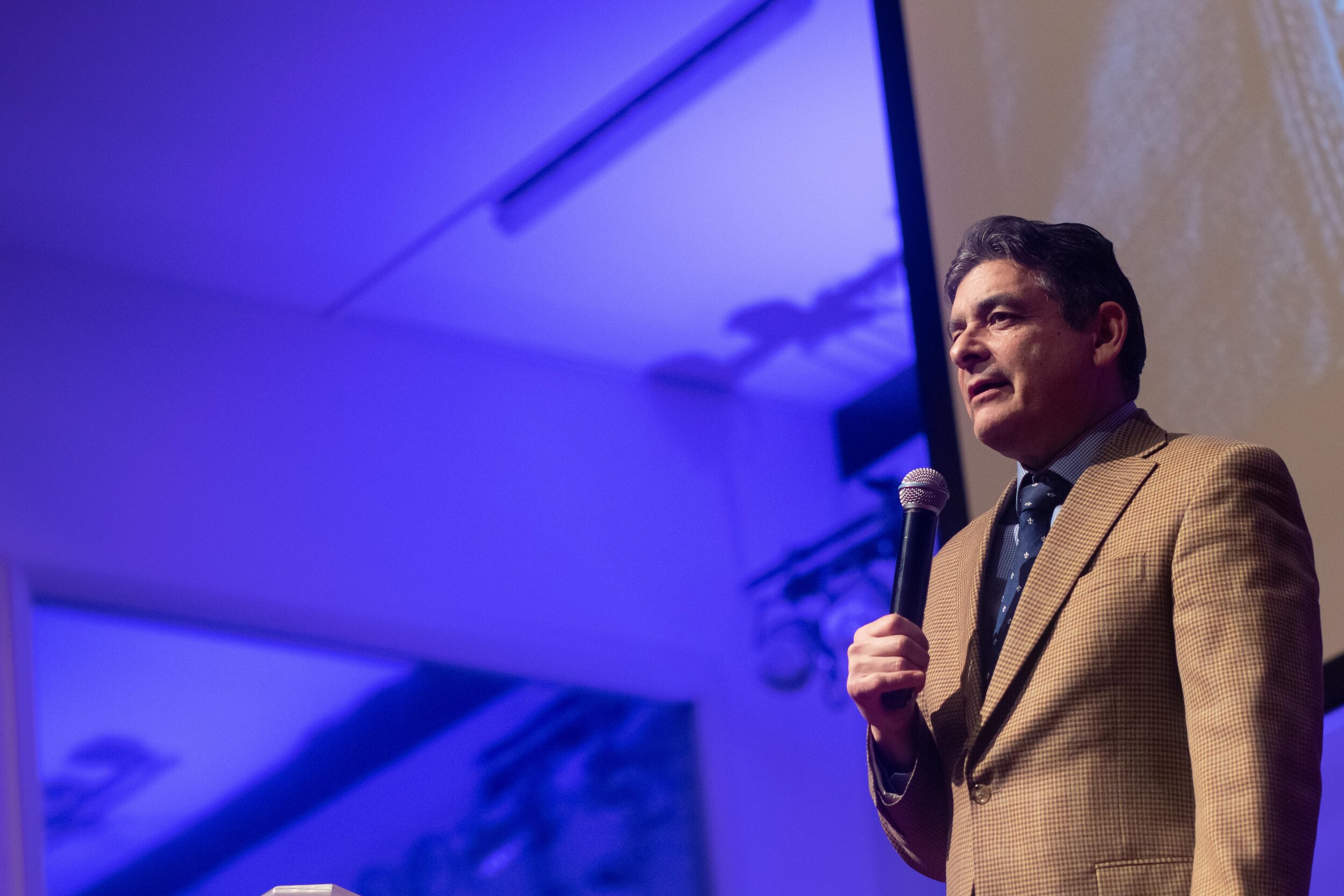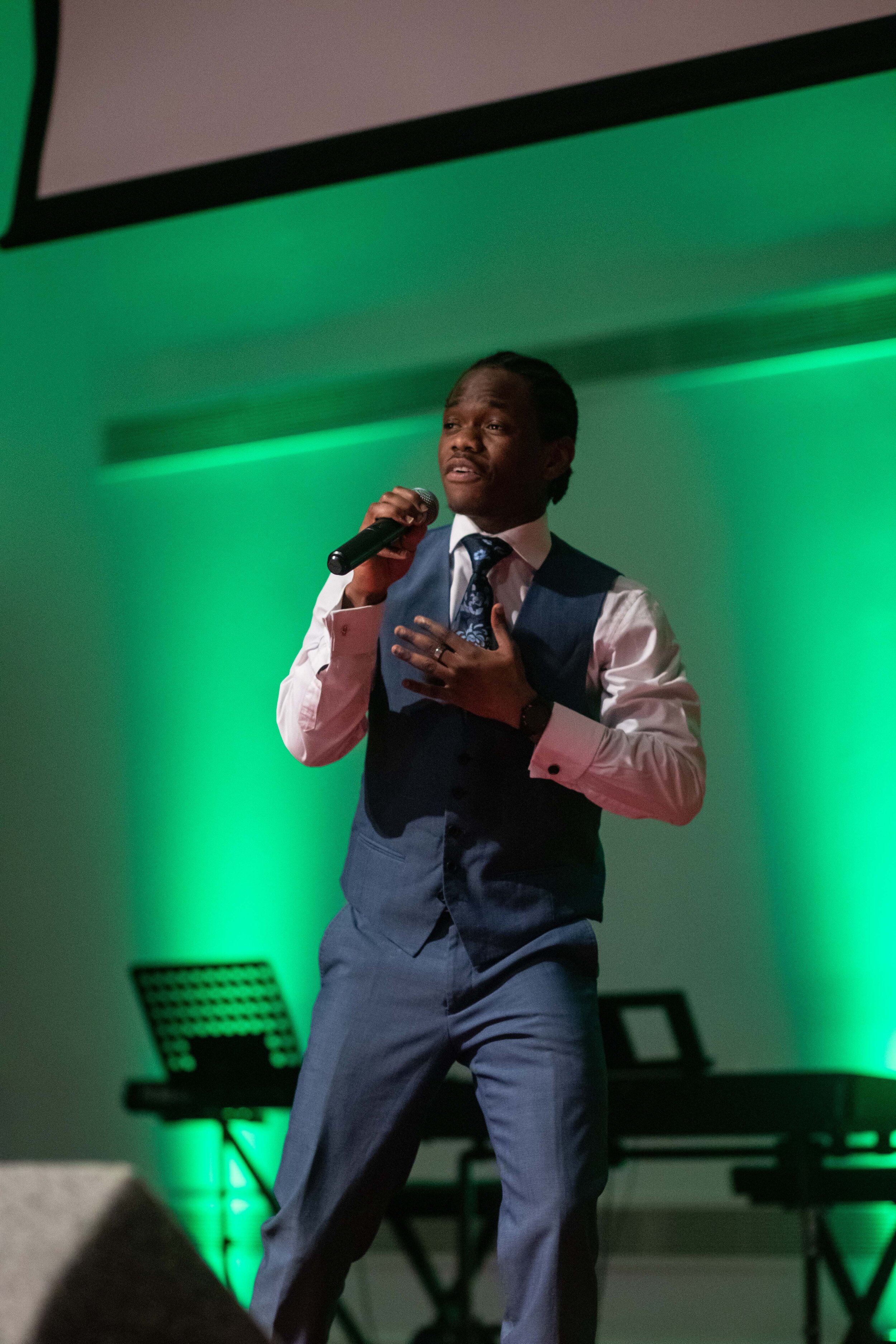Special Services With Ps F.Rubi
We had a powerful time with Pastor Fred Rubi today, if you haven’t made it out there’s still one day left tomorrow at Transformation House, SW11 1AD from 7pm
Join Us!
Give More, You Get More
When you give more, you get more? This paradox is a principle that has been taught in the church, yet a common misconception is that giving more will somehow diminish what you already have. However, it does the very opposite. There is beauty in giving and sacrificing and the greatest example that we have of this can be taken from Jesus. He paid the ultimate price and wiped away our sinful debt. What did He gain? Fellowship and a relationship with us, which He and the Father deemed was more important than His precious life.
Luke 6:38 says:
“Give, and it will be given to you. Good measure, pressed down, shaken together, running over, will be put into your lap. For with the measure you use it will be measured back to you.”
Jesus promises us that when you give, it will be given back to you. We see this promise being fulfilled in scripture even before Jesus spoke these words. In 1 Kings 17:7-16, Elijah approaches the widow of Zarephath during a drought and asks her to provide food for him. She was poor and only had a handful of flour in a jar and a little oil in a jug left to sustain her, until she and son would eventually die of hunger. However, she trusted in God and provided for the prophet. After this sacrifice, neither the jar of flour was nor the jug of oil became empty. This widow gave all that she had but she gained more than she had ever imagined.
When God gives back to His people, He doesn’t hold back, in the text it says that He gives back with “good measure” and it’ll be “running over.” However, it is essential for us to realise that we cannot give a little and expect a lot from God. God loves a cheerful giver (2 Corinthians 9:7) and as He is God, He knows our hearts. In the Bible, we are also told that if we sow sparingly, we will reap sparingly, but if we sow abundantly, we will reap abundantly (2 Corinthians 9:6).
The principle of giving more to get more doesn’t only apply to financial giving. Jesus says that “whoever wants to save their life will lose it, but whoever loses their life for Me will find it” (Matthew 16:25). When Jesus said this, He was saying to the disciples (and us) that He wanted us to be willing to give up our earthly existence for Him and in return we would gain eternal life and salvation. This is in comparison to us cherishing our earthly lives which, without sounding morbid, do not measure up to eternity. Almost every Christian has asked themselves if it’s really worth it to follow Christ and give up our comfortable, sinful lifestyles? The answer is: it is. Whatever you give up and lose on earth, you will be rewarded for it in heaven and that’s where it really counts because heaven is eternal.
It’s not easy to give, it takes a lot of faith and selflessness, however, God is faithful and He is the maker of the universe, which means that He has an unlimited amount of resources. God doesn’t actually need our money or our time, because He is God and He would be able to source it elsewhere. He asks us to give because He wants to teach us about sacrifice and to be willing to sacrifice those things that we hold so dearly onto, the beauty of this is that He will always give it back to us and will always sustain us.
What You Don’t Want To Do
It is a fundamental principle that sometimes in life in order to get what we want; we might have to do something that we do not want to do. This is a principle that applies to so many different day-to-day scenarios. For example, to get in shape, you are going to have to work out when you do not want to, to buy a house, you are going to have to save money when you would rather be spending it.
A beautiful example of someone doing what they did not want to do, to get what they wanted can be taken from Luke 20:40-43:
“When He came to the place, He said to them, “Pray that you may not enter into temptation” And when was withdrawn from them about a stone’s throw, and He knelt down and prayed saying, “Father, if it is Your will, take this cup from me; nevertheless, not my will but yours be done.” And then an angel appeared to Him from heaven, strengthening Him.”
Frankly, Jesus did not want to go to the cross, in the text we can see that His heart was heavy as He contemplated what was to come. We often forget that Jesus, in His ultimate majesty as God, was also fully man, which meant that He felt human emotions. Yet, despite His concern, He says to the Father, “not My will but Yours be done.” Jesus could have easily prevented Himself from going to the Cross, but because His desire for us was so potent, He did what He didn’t want to do to get what He wanted, which is a relationship with us.
Our hedonistic society tells us that a mark of success is being able to do what you want, when you want to do it and how you want to do it. However, the problem with this mentality is that people will do what they want, and get what they thought they wanted but later realise that this is not actually the case. Take the example of Judas. He betrayed Jesus knowing that he was going to receive money for it. When he received the money, he realised those pieces of silver were not worth the crime he had just committed. Consequently, he took his own life. Judas is a clear example of someone doing what they wanted, thinking that it would fulfil them but only to be left empty and hopeless.
Many times the problem with doing exactly what you want to do without a second thought is that you fail to see the bigger picture. Often we sacrifice tomorrow’s accomplishments for today’s satisfaction. Judas could not see the bigger picture. He sacrificed an eternal relationship with Jesus for pieces of silver. We ought to be cautious that we do not follow this path as well. Do not sacrifice your relationship with God for something fickle and temporary.
It’s hard but doing what we don’t want to do will indeed help us to get what we want. We read of people in the Bible who did amazing things and felt the power and presence of God. We desire these very experiences, yet we do not want to do what they did. We want God to move like He did for Esther, but we don’t want to fast like she did. We want God to bless all our future descendants and us, but we do not have faith like Abraham had.
When Jesus was faced with His fate, He sought God. He prayed and He remembered that it was not His will but God’s that had to be fulfilled. When we are faced with the the option of taking the easy way out, we need to remember Jesus and the example that He set when He went to the cross for us, despite knowing the torture that He would endure. Hopefully, we will never have to endure anything like that but in our day to day lives let us be like Jesus and do what we don’t want to do, to do what we want to do, whether it’s exercising, saving money, praying or waiting on God.
Do Less to Do More
The idea of doing less to do more sounds like a bit of an oxymoron and that’s because it is. Our fast-paced society believes that the key to productivity is finding ways to get more done. However, if we look to the Bible we can find that there is a key instance where doing less actually resulted in a better outcome than taking on more work.
In Luke 10:38-42, Luke recalls the story of Martha and Mary:
38 Now as they went on their way, Jesus entered a village. And a woman named Martha welcomed him into her house. 39 And she had a sister called Mary, who sat at the Lord's feet and listened to his teaching. 40 But Martha was distracted with much serving. And she went up to him and said, “Lord, do you not care that my sister has left me to serve alone? Tell her then to help me.” 41 But the Lord answered her, “Martha, Martha, you are anxious and troubled about many things, 42 but one thing is necessary. Mary has chosen the good portion, which will not be taken away from her.”
There are so many lessons that we can learn from the story of these two sisters. Martha and Mary had two different outlooks on life. Martha was focused on being a good hostess whereas Mary’s attention was purely on Christ. Martha was distracted. However, her distraction wasn’t anything bad or sinful. In the eyes of society and in accordance with the culture of the time, she was doing the right thing. She was serving her guests and of course, the guest of honour, Jesus. The text suggests that Martha was devastated that she wasn’t receiving praise for the blood, sweat and tears that she was putting into being a good hostess. This raises an important question, “Why was she doing it?’
Many have often shunned Martha and boldly proclaimed that if they were in the presence of Jesus at that very moment they wouldn’t be concerned with the earthly obligations, as Martha was. Rather, they claim they would just be sitting at the feet of Jesus taking in His good news. But how many times in our serving and ministries are we distracted from what the purpose of our service is? Or how many times do we sulk and whine when we aren’t given the attention we think we deserve for the hard work that we are putting in?
The truth is that we all have a bit of Martha in us. We take on all these responsibilities and do more but get less done. At the end of the day, our goal in our salvation is to be like Jesus and to get closer to Him. Getting closer to Jesus does not come from taking on more ministries and responsibilities, it comes from spending time in His presence. Mary sat at the feet of Jesus and she gained more in that moment than Martha did in the kitchen. The saddest part in the story is that Jesus was in Martha’s house, yet she had no peace. So often as Christians, because we are doing so much and are anxious about who’s watching us and what praises we get, we’ll be in the house of God, with the presence of God moving so forcefully yet, like Martha, we have no peace. When you’re distracted, you no longer see Jesus, even if He’s right in front of you like He was in Martha’s house.
It is essential to note that when Jesus gently rebuked Martha in verse 41-42, He wasn’t saying that what she was doing wasn’t important, He was just trying to show her that He is more important. Your ministry and the service you provide is very important and we are called to serve (See 1 Peter 4:10-11) but Jesus is actually more important than that service. When you take on so many tasks and they become a distraction, that’s when you miss Jesus.
So how do we do less to do more, you ask? We simply become Marys. Jesus says to Martha, “Mary has chosen the good portion, which will not be taken away from her.” Mary did less than Martha, yet she gained more because the time she spent at the foot of Christ was more precious than the glory that Martha wanted to gain from being seen as a good hostess. Ultimately, we need to sit at the feet of Christ, hear His word and enjoy His presence like Mary did. This is how we do less to do more.
Let Us Run With Endurance
The marathon, an unforgiving test of endurance as you traverse the uneven terrain spanning a seemingly endless perimeter. Some make it their life goal, an accomplishment like no other, training to face the mammoth task with precision engineered nutrition, sleep and training. The day arrives and their bodies are primed, their muscle fibres twitching as they prepare to emerge victorious in the war that will almost certainly ensue. It’s the calm before the storm.
Hebrews 12:1
12 Therefore we also, since we are surrounded by so great a cloud of witnesses, let us lay aside every weight, and the sin which so easily ensnares us, and let us run with endurance the race that is set before us'
Many of us have attempted to run the race of enduring faith as if it were a sprint, only to find ourselves weak, weary and overcome with a feeling of fatigue. Tempted to give up, to perhaps return to the sin which so easily ensnares us. This scripture serves not only to remind us of the method we must adopt, but also to instruct us of the preparations we must make in order to finish the race. We must position ourselves as athletes of a different kind, harnessing the word of God as our spiritual food (Jeremiah 15:16) and our prayer a form of training. Just as marathon runners turn to the pioneers in sportswear technology in order to run their race in the most aerodynamic, weight saving clothing. We must turn to God and lay aside every weight of sin that inhibits our steps toward Jesus.
We can find hope in the knowledge that although each step towards God may feel as if it brings new and uncomfortable uncertainties. He has already gone before us and will never leave us nor forsake us (Deuteronomy 31:8) for God did not send his son into the world to condemn the world, but that the world through him might be saved (John 3:17).
Written by Daniel Campbell
One Foot in Front
A Testimony by Royston Labrooy
Boring, unattractive, religious, these are the words I once used to describe the church.
Growing up in a catholic family with its customs and ritualistic expression seemed a far cry from the fun, free, unrestricted path that the world had to offer. What was on offer? A carefree lifestyle where alcohol and cannabis were part of the daily routine. I thought I was doing fine, I mean, everything at least made sense, until that day, during that conversation. I remember the feeling of brokenness and loss of identity. The man who I believed to be my father, all of a sudden wasn’t. As my mother spoke my mind began to drift, who was I? What do I do now?
A close friend of mine invited me to church. It felt like the sermon was tailored to be a perfect fit for my situation. ‘God is your father, God loves you, God will never forsake you’ were words that not only provided comfort but also stirred something inside of me. I realised I wasn’t right with God, I was far from God, but finally I was ready to accept him as my Lord and Saviour.
Reading, praying and fellowshipping were becoming all the more frequent until my Christian walk took an adverse turn. I began to reminisce, thinking about the pleasures of the world and as our brains so often do, the painful memories were eradicated and replaced with the fantasy that life had been a blissful, fulfilling experience up to this point.
I became isolated, relegated to a putrid life that consisted of an almost compulsory, insatiable, continuous cycle of destruction. Smoking and drinking were almost obligatory activities.
I distinctly remember avoiding Tooting as I knew that I would have to come face to face with a past I had left behind. I think deep down it was a way to avoid the spiritual conviction that would follow.
After months of rejecting the idea of returning to church, and more importantly God, I accepted a friend’s invitation to attend a service. Although I came with the wrong motive, God began to deal with me during the service.
It was like God was talking to me, telling me that he had a destiny for me.
The things that for so long had held me a captive of sin were dealt with, not on my own strength but the pure power that comes from the word of God. There were no quick fixes, no overnight perfect discipleship program but over time God changed my heart.
I was never one who possessed natural flair or a desire for public speaking, an introvert by nature, and this shy, reclusive character was changed. I now have a passion for the things of Christ, even if that means being in uncomfortable situations. I realised that many people in the Bible would perhaps not be deemed natural choices as leaders. I was a man of excuses, but God continued to change me into an overcomer, willing to be used by God, leaning on his strength in unsure times.
My message to anyone reading this would be to come as you are. God doesn’t ask us to come to him in a perfected state; in fact it is impossible to attain perfection by ourselves. Through Christ we are made clean in the sight of God. God will change you if you trust and put one foot in front of the other.
Out Of The Boat
We all know the story of how Jesus walked on water and how Peter briefly walked on water as well, but doubted and began to sink until Jesus reached out to save Him. There is much to learn from this story and from Peter and Jesus’ actions.
Matthew 14:22-36:
“22 Immediately he made the disciples get into the boat and go before him to the other side, while he dismissed the crowds. 23 And after he had dismissed the crowds, he went up on the mountain by himself to pray. When evening came, he was there alone, 24 but the boat by this time was a long way from the land, beaten by the waves, for the wind was against them. 25 And in the fourth watch of the night he came to them, walking on the sea. 26 But when the disciples saw him walking on the sea, they were terrified, and said, “It is a ghost!” and they cried out in fear. 27 But immediately Jesus spoke to them, saying, “Take heart; it is I. Do not be afraid.”
28 And Peter answered him, “Lord, if it is you, command me to come to you on the water.”29 He said, “Come.” So Peter got out of the boat and walked on the water and came to Jesus. 30 But when he saw the wind he was afraid, and beginning to sink he cried out, “Lord, save me.” 31 Jesus immediately reached out his hand and took hold of him, saying to him, “O you of little faith, why did you doubt?” 32 And when they got into the boat, the wind ceased. 33 And those in the boat worshiped him, saying, “Truly you are the Son of God.”
Jesus walking on water is connected to an earlier episode in the gospel in which He calmed the storm (Matthew 8:18-34). The “water” and the “storm” in these instances could be interpreted as trying times or a period of uncertainty. In both instances, Jesus easily overcomes the water and the storm and rescues the disciples. He proves Himself to be Lord of the wind, waves, water and the sea; all of which made the disciples anxious. Peter stepped out of the boat because, in that moment, He trusted Jesus with his life but it was only when he noticed the wind around him that he began to sink. Many times when we trust Jesus with our lives, our relationships, our finances, our jobs etc. we “walk on water” and do miraculous things but when we notice the wind and take our eyes off Jesus, for example, by doubting God, that is when we begin to sink.
What’s more notable about this is that the disciples had just witnessed Jesus feeding the five thousand and other miracles before that therefore, they knew what He was capable of. Yet in both instances, they still doubted Him and had little faith even though they knew that He could easily rescue them in the twinkling of an eye. We are, somewhat, a representation of the disciples. We have witnessed the miracles of Jesus in our lives, our families’ lives, yet when the storm comes and we notice “the wind” around us, we forget everything that Jesus has done and begin to panic and sink. However, the beauty of Jesus, our Saviour is that He is exactly that: A Saviour. When Peter began to sink, he cried out to Jesus, “Lord, save me,” and Jesus immediately did exactly that. This echoes Romans 10:13, where Paul writes “for whosoever shall call upon the name of the Lord shall be saved.”
Peter’s attempt to walk on water shouldn’t be wholly viewed as a failure because even in his fear, he still cried out to the Lord. He knew that Jesus was the only one who could save him – not the other disciples. When hard times approach, let your first instinct be to call out to Jesus to save you. In verse 32, when Jesus and Peter got into the boat, the wind immediately ceased, which shows us that when Jesus gets in “our boats” i.e. our lives, the storms of life will calm and we can worship him like the disciples did. Although, we should always have faith, we are human and there will be times when we will lack faith and begin to sink, but let us be encouraged by the fact that all we have to do is call upon His name and He will save us.





















